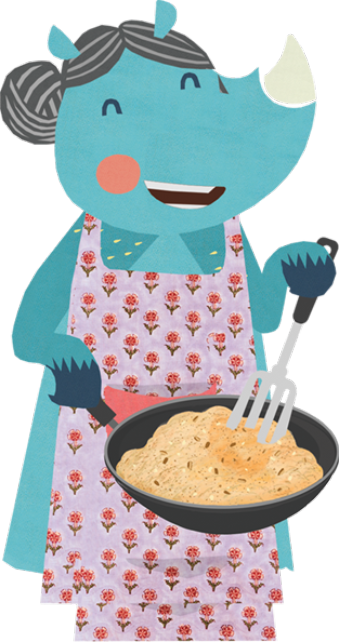Weight gain foods for babies, a complete guide on tips and tricks
'Weight gain foods' is one of the most searched phrases in any parent's Google guide. It perhaps is one of those parenting metrics which can be quite stress-inducing. Everyone has an opinion on whether your baby is looking healthy or not and everyone is quick to give free advice on tips and tricks that help “plump” up your child!
While weight gain is indeed very important, the emphasis should be on healthy weight gain. it is important to remember that the main aim is to give a balanced diet that provides all the right kind of nutrition for kids. This is central to healthy growth and development.

Furthermore, every child is different and grows differently. This can be due to metabolism, genetics, and a number of other factors. These, however, can sometimes alarm parents who feel that their child is not putting on weight fast enough. This comes back to keeping in mind the main priority: get the basics right with simple ingredients and healthy recipes and the weight gain will come eventually, in its own time.
A good way to mitigate this stress is to plan and organize how your child is eating, at least until about 15 months or so. Food charts are a good way to list down all the items your child is eating and keep track of whether all the nutritional requirements are being met. This visual representation of a diet also helps you position and time your child’s meals and snacks along with making sure there is enough variety to keep them interested. Fussy kids can be quite a struggle to feed and planning for this in advance is the way to go about it.

Food is central to all of this and is important for healthy brain development, immunity building, and healthy weight gain.
Check out our list of top 10 weight gain foods that you should definitely be giving your baby:
1. Breast milk (for babies)
This one is a no-brainer. It is recommended that a baby is exclusively breastfed during the first 6 months after birth as this is the most nutritious, easily digestible, perfectly balanced, and healthiest superfood that builds your child’s immunity for life. It also fosters the bond between mother and child.
If your baby is active, healthy, and passing stool a few times a day, it indicates that they are getting enough breast milk. After 6 months of age, you can introduce liquids and semi-solid foods to your baby’s diet along with breast milk.
2. Bananas
Bananas are great for potassium, Vitamin C, Vitamin B6, and carbohydrates. They are also calorically dense and are particularly effective for healthy weight gain. Bananas taste great and are easy to incorporate into recipes as well, you can Mash bananas or serve them as a smoothie or shake. It can be a part of your baby bag while traveling and makes for a convenient snack.
3. Sweet potato
Keep your baby away from artificial sweeteners and sugary foods, but introduce them to natural sweeteners, one such is sweet potatoes. An excellent way to add not just some high-calorie options to the menu, but, this way you'd be exposing your little one to a range of unique flavors. You could mash it at an early stage, and later prepare them as sweet potato fries. What's better than this finger food for a growing toddler?

4. Pulses/lentils
An Indian household is no stranger to pulses and dals. They are great sources of protein, vitamins, and minerals. After 6 months of age, you can introduce these in the form of soup or daal paani, which is a great way to introduce daal to your baby while retaining all its nutrition.
You can also make khichdi from daals, these are easy to swallow and easy to digest for your baby. You can start introducing these after 7 months of age so that your baby can slowly start exploring new flavors, textures, and tastes.
Pro tip:
1. Introducing good habits at an early age are more likely to ensure that they last.
2. The baby foods you use now will decide how much your child will reach for junk food as they grow up and what kind of immunity they will have later on.
3. Getting the basics right at the right time can ensure fuss-free healthy habits, strong immunity, and fewer visits to the doctor.
4. Combining this nutrition for kids with mental and physical stimulation and exercise tops off the to-do list of healthy growth and development for your baby.
5. Millets and ragi
Also known as finger millet or ‘nachani', ragi is a superfood from our grandparents’ time and is a great source of vitamins and minerals. It can be used to make porridge and ragi flour can be used as a replacement for atta or maida in the kitchen. Ragi is great for healthy weight gain and overall development. It is easy to digest and is light on the tummy.

6. Dairy
Adding Dahi (yogurt) to the diet after 1 year of age will also help in healthy weight gain. Dahi has healthy probiotics that are great for a healthy stomach and healthy digestion.
Dahi is also a lot of fun to cook in the kitchen. Some other dairy items that are equally healthy are cheese and butter. In the right proportions and given after 1 year of age, these are great sources of healthy fat for your child. Do consult a pediatrician before introducing meat and dairy to your child. One can also make paneer (cottage cheese) at home using milk and Dahi or lemon. Cottage cheese is known for its baby-friendly texture is also versatile enough that you're sure to find a way to get even the pickiest eater to like it.
7. Eggs
Eggs are perhaps the richest source of proteins, vitamins, and healthy fats. These are full of healthy calories, are calorically dense, and can be prepared in several different ways as per the age of your child. Start introducing eggs after one year of age, these will help keep your baby full, their immunity strong and the healthy weight gain coming.
8. Avocados
These are a great way to give your child healthy fats and vitamins. Served as dips or spreads, avocados are an irresistible addition to your little one's meal. You can even make a delicious and nutritious milkshake with avocados!

9. Tropical fruits and vegetables
Rich in natural sugars, essential vitamins, and immunity-building minerals, tropical fruits and vegetables are a must in every child’s diet chart. These include bananas, papaya, and mangoes. Toss steamed vegetables in some butter or put together a colorful fruit salad for your child to tuck into at snack time.
10. Oats
Oats are known for their rich fiber content are excellent for aiding healthy bowel movements and the prevention of constipation. They are one of the best dishes to start your little one's day with and are packed with iron, zinc, magnesium, and thiamine, making every bite a healthy one. Oats are an all-inclusive ingredient that can be included for babies, children, and even you!
Disclaimer:
1. Make sure to follow the 3-day rule. Note down the new ingredients introduced in the baby’s diet to look out for any allergic reactions
2. It is common for babies to reject unfamiliar foods, as they wean. Be patient and keep offering a variety of foods. Do not worry, this is perfectly normal
3. Please remember that some foods can irritate your baby's digestive system. Avoid highly spicy or greasy foods. Also, avoid foods that could easily cause choking
4. If your baby as several episodes of vomiting after trying new food, has diarrhea, develops a rash, or has swelling of the lips or eyes, he or she may be having an allergic reaction. Stop the feeding and call your pediatrician





